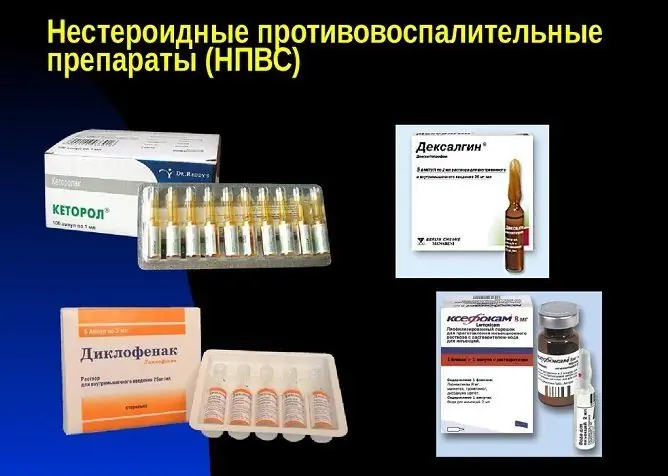- Author Rachel Wainwright wainwright@abchealthonline.com.
- Public 2024-01-15 19:51.
- Last modified 2025-11-02 20:14.
Remedies for chickenpox: how and how to treat the disease
The content of the article:
- Epidemiology
-
Clinical course
- Rash
- Intoxication syndrome
-
Treatment
- Symptomatic local remedies
- Antipyretic drugs
- Antiviral drugs
- Antibiotics
- Traditional medicine
- Prevention
- Video
Chickenpox remedies must be safe and effective in relieving symptoms. Chickenpox, or chickenpox, is an acute viral disease resulting from the ingestion of a pathogen - the varicella-zoster virus (Varicella Zoster), which belongs to the third group of herpes viruses.

Remedies for chickenpox should effectively stop the symptoms of the disease
A person is highly susceptible to this virus, which is about 70-90%. The prevailing mechanism of transmission of the virus is airborne.
Varicella-zoster is unstable in the external environment and quickly dies under the influence of ultraviolet rays, when heated, etc. Outside the human body, the virus can maintain its viability for no more than 10-15 minutes.
Epidemiology
The source of infection is a sick person who spreads the virus into the environment. Patients with vesicles in the oral cavity are especially dangerous in terms of transmission of infection, since they release huge doses of the pathogen.

Varicella Zoster is transmitted by airborne droplets
The sick person presents an epidemiological danger at the end of the incubation period (from 6 to 24 hours before the onset of the rash) and within 5 days after the appearance of the last elements of the rash.
This is a typical childhood airborne infection. Newborn babies in the first few months of life, when breastfeeding, due to the presence of maternal antibodies, are not exposed to the virus.
Subsequently, the susceptibility to the virus increases, reaching a maximum of 3-4 years. Therefore, the bulk of the sick (about 80%) falls on the age category of preschool children.
Clinical course
The incubation period for chickenpox is 2 to 3 weeks.
At this time, usually the patient is not worried about anything. In rare cases, a slight manifestation of intoxication syndrome is possible (weakness, lethargy, loss of appetite, an increase in body temperature to 37 ° C, etc.).
Rash
After a prodromal period, lasting approximately one to two days, a period of rashes follows. The rash appears in waves over several days. At the very beginning, specific spots are formed on the skin of the scalp, face, trunk, limbs. With a pronounced process, the rash can spread to the palms and soles.

Rashes appear after the prodromal period
After going through the stages of spots and small papules, they quickly turn into vesicles - specific elements of chickenpox. The vesicles have the appearance of round or oval formations of various sizes that rise above the surface of the skin. Their wall is tense, shiny, the liquid they contain is transparent.
A hyperemia zone is formed around the elements - a small red strip. When the vesicles are punctured, a clear liquid flows out of them. Their rupture provokes severe itching.
As the elements progress, the fluid contained in them turns from transparent to unclear (due to the settling of fibrin filaments). The elements dry out, after three to four days, crusts form, falling off after a few weeks. A rash can be observed not only on the skin, but also on the mucous membranes, involving the membrane of the oral cavity, genitals, nasopharynx, etc.
Intoxication syndrome
Depending on the severity of the process, intoxication syndrome may be absent, moderate or severe.
With severe intoxication, there is a high body temperature (up to 39 ° C), a profuse rash.
Treatment
The tactics of managing and treating a patient is selected individually by a doctor and depends on the severity of the disease.
A modern approach to the principles of therapy:
- adherence to bed rest during the acute course;
- good balanced nutrition;
- hygiene measures (frequent ventilation of the room, wet cleaning, compliance with the optimal temperature regime in the room);
- drug therapy - complete, comprehensive, reasonable.
Uncomplicated chickenpox is usually treated symptomatically on an outpatient basis.
Symptomatic local remedies
Symptomatic medicine for topical chickenpox should have antipruritic, drying, anti-inflammatory, antiseptic effect.

Fukortsin can be used to treat the rash
List of effective topical chickenpox remedies:
- solution of Methylene Blue or Brilliant Green (brilliant green): in addition to the fact that they have antiseptic properties, the use of these dyes allows you to determine the dynamics of rashes;
- Fucorcin (Castellani liquid): a bright raspberry or colorless solution containing phenol, boric acid, resorcinol, acetone, fuchsin solution, 95% ethyl alcohol. Available in bottles of 10 and 25 ml. Fukortsin is used for antiseptic purposes;
- Zinc ointment: reduces the severity of the exudative process, has a softening, adsorbing, antihistamine and antiseptic effect. When applied topically, it dries up vesicles, reduces inflammation;
- Calamine Lotion: a cosmetic product containing calamine and zinc oxide. The drug has a cooling, soothing, antipruritic, decongestant, anti-inflammatory effect;
- Allantoin and Dexpanthenol: used to soften and regenerate the skin quickly.
Antipyretic drugs
With pronounced intoxication syndrome and elevated body temperature, it is possible to use non-steroidal anti-inflammatory drugs (NSAIDs), mainly paracetamol. They are available in various pharmacological forms: tablets, suppositories for rectal administration, syrups for oral administration, etc.
Antiviral drugs
With a severe course of chickenpox and an increased risk of possible complications, drugs are prescribed that have an antiviral effect on the herpes virus, most often - Acyclovir.

Acyclovir is prescribed for severe pathology.
Acyclovir inhibits viral replication, as a result of which its amount in the blood and in target organs progressively decreases.
The dosage is selected individually depending on the severity of the process, the patient's age, the state of the immune system, concomitant diseases, etc.
Antibiotics
When a secondary bacterial infection is attached, antibacterial agents (antibiotics) are prescribed.
Outwardly, upon confirmation of secondary infection, Baneocin can be used in the vesicle zone.
Traditional medicine
For severe itching that interferes with the child's sleep, you can drink soothing teas with herbs such as mint or lemon balm. In cases of rashes in the mouth, rinsing with chamomile and sage infusions has a good effect.
It is not recommended to treat a child using folk remedies without first consulting a doctor.
Prevention
At the moment, there are methods of specific and non-specific prevention:
| Prevention method | Description |
| Nonspecific | It consists in isolating patients at home or in a hospital up to 9 days from the onset of the disease. It is necessary to carry out frequent ventilation and wet cleaning in the room where the patient is. |
| Specific | Vaccinations against varicella-zoster virus. The vaccine induces persistent long-term immunity to the varicella-zoster virus |
It is known that the varicella-zoster virus is prone to persistence (long-term stay in the patient's body), causing a relapse over time in the form of shingles, accompanied by unilateral herpetiformis painful rashes.
In most cases, the prognosis for chickenpox is favorable. With the appearance of severe complications, as well as in persons with severe immunosuppression, the prognosis is poor.
Video
We offer for viewing a video on the topic of the article.

Anna Kozlova Medical journalist About the author
Education: Rostov State Medical University, specialty "General Medicine".
Found a mistake in the text? Select it and press Ctrl + Enter.






